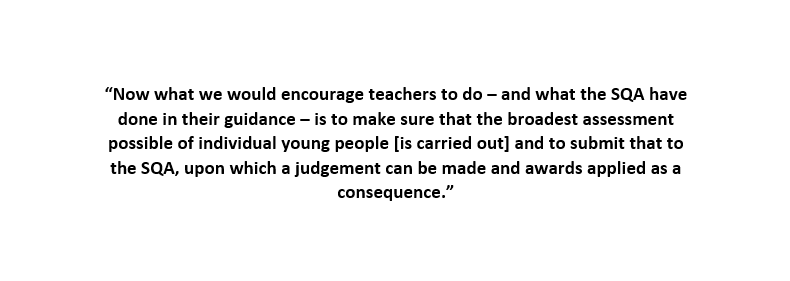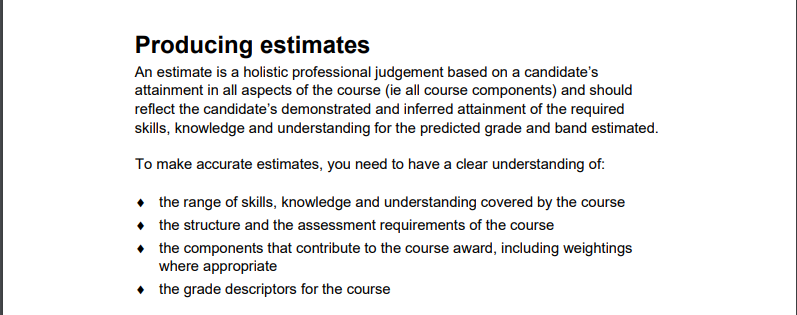Much of this might not be unnecessary as John Swinney has announced there will be some sort of u-turn on Tuesday, but in the absence of any detail I think it’s useful for us to be clear about why the appeals system that the govt has pushed is actually completely unacceptable.
Also, until we have that detail, we need to assume that parts of this system could be retained in their latest solution - as I'm going to show, that would be a disaster.
So how did we get here? Well in response to the SQA results scandal – which has seen the poorest pupils sacrificed and the wealthiest protected – the standard defence has been: trust the appeals system.
The govt wanted us to believe that anyone unhappy with their grade could appeal it, and that the appeals system would resolve any injustices. Were those claims true? Regular readers will be unsurprised to find that the answer is a resounding NO.
There are various problems with the current situation, the most obvious being asking people to trust a system that has failed and that is led by people who either failed to see obvious problems coming or didn’t care enough about them to do anything.
We were told to trust the system and it brought us here – are people really supposed to believe that same system, or a new one devised by the same people, will now save us? Make your own mind up on that.
But let’s say we get past that hurdle (somehow) – then what? Is the system sound and reliable? Could it really resolve all the injustices? The short (and, by now, entirely expected) answer is – no. Why? Well, let’s dive in…
First of all – who can appeal? The impression has been given that anyone unhappy with their results can use the system. This is categorically untrue.
In order to be eligible for an appeal a student’s awarded grade must be lower than their estimate – there is no option to appeal the estimate itself.
This isn’t an entirely indefensible position, although even as a teacher I think *some* mechanism to challenge estimates is probably a good idea (especially in these circumstances) but the issue is honesty.
It’s quite clear right now that lots of people think appeals are open to ALL students, and they think that because of the things that Sturgeon and Swinney have said.
This might just be because they’re not fully across the details of their brief (but what would that tell us?) or it might be a deliberate attempt to muddy the waters and buy some political time. Either way it isn’t on.
That’s all bad enough, but it isn’t even the biggest area of concern, which relates to the actual rules around the appeals process. To be blunt, it looks as though the SQA is trying to rig the system against students and teachers.
To understand how this is being done, we need to understand how teachers arrived at the estimates they submitted to the SQA (only for so many of them to be ignored). Some people seem to think that estimates are just a prelim mark and a glance over some coursework. They’re not.
Now back in April, when people like me were pointing out that the proposed results system was going to be horrendously unfair, John Swinney insisted that we were wrong.
Speaking to the BBC, he was adamant that results would not be based on a school’s past performance – “that’s not in any way what the SQA are doing”, he said.
This has of course proven to be completely wrong, but to be fair it was completely wrong even at the time he said it.
This has of course proven to be completely wrong, but to be fair it was completely wrong even at the time he said it.
The word for this – and it’s a word that Swinney used repeatedly – is “holistic”. The idea is that to properly assess a pupil you have to look at everything you know about them, rather than restricting yourself to a narrow set of formal metrics (like prelim scores).
To be clear, just sticking to the stuff like prelims is the easy solution. It’s the one that laymen will understand. But it isn’t the correct approach because it produces unreliable results (as any teacher could tell you).
So teachers were told, in effect, to do the job properly. And then, because they’re teachers, that’s exactly what they went out and did.
And here is where the major problem arises, because the SQA’s advice around appeals then made clear that a great deal of the information that had informed the estimates (on their own instructions) would now be inadmissible as appeals.
Basically appeals were to be restricted to prelim papers, coursework, class tests etc. All evidence would need to include things like formal marking instructions. This was all a long way from what teachers were being told a few months back.
And, as a final kick, although a commentary could be provided to support the application, that could only apply to the type of evidence above – personal circumstances, inferred progression data and a whole host of other information would not be acceptable.
This looked like a simple attempt to rig the system, supressing the number of appeals and vastly reducing the likely success rate as well. I would very much like to know the process that led to it being released.
And even if this approach is now scrapped – and ALL OF IT needs to be scrapped - the fact that it was ever signed off is itself a serious problem in need of rigorous investigation.

 Read on Twitter
Read on Twitter



